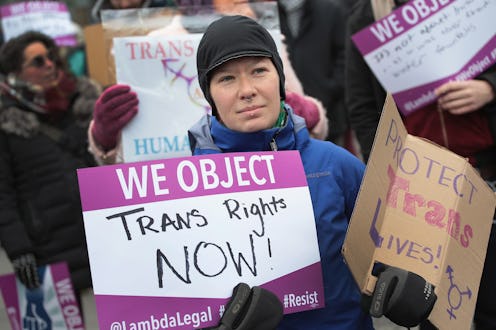News
Repealing Obamacare Could Devastate LGBT Community

Even as Congressional Republicans intensify their attempts to repeal (and, apparently, replace) it, the Affordable Care Act is more popular than ever. According to a survey from the Kasier Family Foundation, 48 percent of Americans view the ACA favorite, hardly a resounding endorsement but a noticeable increase from 43 percent just a few months earlier in December 2016. Moreover, a study in the New England Journal of Medicine estimated that 43,000 Americans could die annually if the Affordable Care Act is repealed. While an ACA repeal would likely have dire consequences for the health of people across the country, one of the groups that is likely to be hit hardest is the LGBT community.
"People couldn't afford [health insurance] before," Laura Durso, who serves as Vice President for the LGBT Research and Communications Project at the Center for American Progress, tells Bustle. "The Affordable Care Act made it possible for LGBT people to access coverage and have the support that they needed to be able to pay for it."
The ACA addressed a number of major healthcare concerns that specifically affected the LGBT community in terms of costs, preconditions, and discrimination.
Contrary to popular belief, the LGBT community is not, by any means, one of the country's most affluent. In fact, LGBT people are actually more likely to be impoverished than their peers, according to researchers at the Williams Institute at the UCLA School of Law.
Uninsured rates amongst LGBT Americans fell by 24 percent with the passage of the ACA.
"There are significant numbers of LGBT people who are poor and who have large out-of-pocket medical expenses that they can't pay," Durso says.
Under the ACA, expanded eligibility for Medicaid (which provides healthcare for the poorest Americans) and the creation of healthcare marketplaces meant that more low- and middle-income Americans were able to obtain health insurance than ever before. The results were dramatic: uninsured rates amongst LGBT Americans fell by 24 percent with the passage of the ACA, according to the Center for American Progress.
Before the ACA, financial insecurity exacerbated the concern of paying for the treatment of the physical and mental health conditions with which the LGBT community disproportionately copes.
According to the National Alliance on Mental Illness, members of the LGBTQ are three times more likely to suffer from a "mental health condition such as major depression or generalized anxiety disorder" and "fear of coming out and being discriminated against for sexual orientation and gender identities, can lead to depression, posttraumatic stress disorder, thoughts of suicide and substance abuse."
LGBTQ people in the United States also have higher rates of contracting certain chronic illnesses.
"Gay and bisexual men who have sex with other men only make up two percent of the U.S. population, but they actually make up 56 percent of people that are living with HIV in the U.S.," Amy Loudermilk, Associate Director of Government Affairs at the Trevor Project, tells Bustle. Loudermilk also cites the high rates of HIV amongst the transgender population, and specifically amongst transgender women of color.
Because of ACA, though, insurers cannot refuse a patient or charge them more simply because of a preexisting condition like HIV. This protection is "absolutely critical" to LGBT health, says David Stacy, Director of Government Affairs at the Human Rights Campaign.
ACA also eliminated lifetime caps on coverage; your provider can no longer limit the amount they are willing to spend on treatment over the course of your life. "When you're living with a chronic condition like HIV," Stacy tells Bustle, "you reach those lifetime caps quickly."
However, as important as these protections in the ACA are to the LGBT community, the one that may be the most critical is its handling of discrimination.
"[LGBT] people often keep themselves out of the medical and mental health systems for fear of discrimination," Durso says. And that fear is valid.
Loudermilk says it was "unfortunately fairly common," for doctors to refuse to provide basic preventative care for transgender people. She points to the case of Robert Eads, a transgender man who died of ovarian cancer in 1999 after being refused care by over 20 different doctors; Jay Kallio, another trans man, told Huffington Post that his doctor responded to his breast cancer diagnosis by recommending he seek psychiatric help.
But the ACA provided an essential benefit. Section 1557 of ACA prohibits discrimination in healthcare on the basis of race, sex, age, and disability, among other groups. Under President Obama, the department of Health and Human Services made it clear that "sex" protections also included prohibitions on discrimination for sexual orientation and gender identity.
Because of the Affordable Care Act, it would now be illegal for Eads' and Kallio's doctors to refuse to treat them. However, if the ACA is repealed, these protections could be lost at a federal level.
Repeal or replace, it seems clear that the termination of the Affordable Care Act could have catastrophic ramifications for many LGBT Americans. "People need coverage and care," Durso says. "The Affordable Care Act is LGBT health, and we need to be here to protect it."